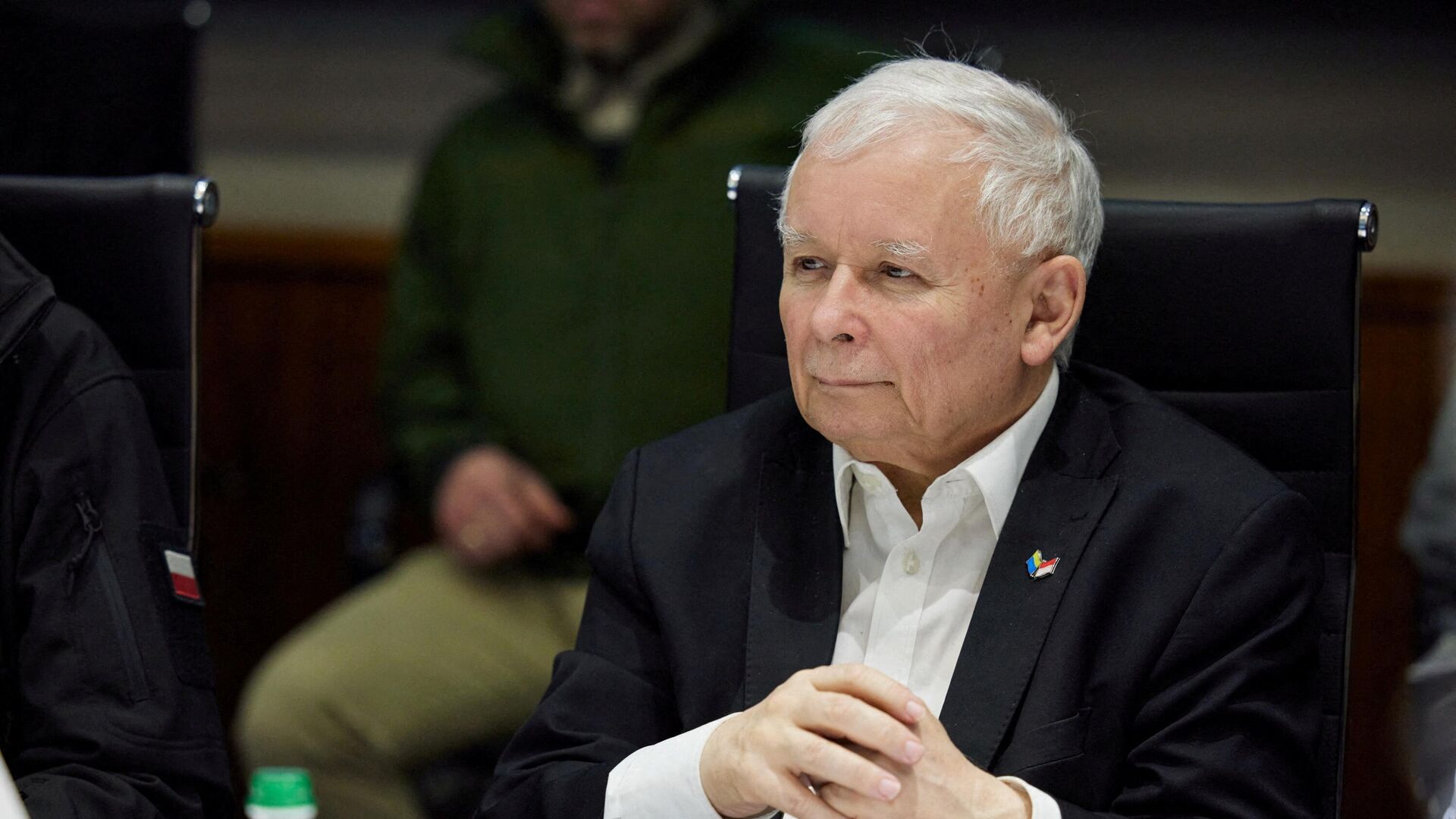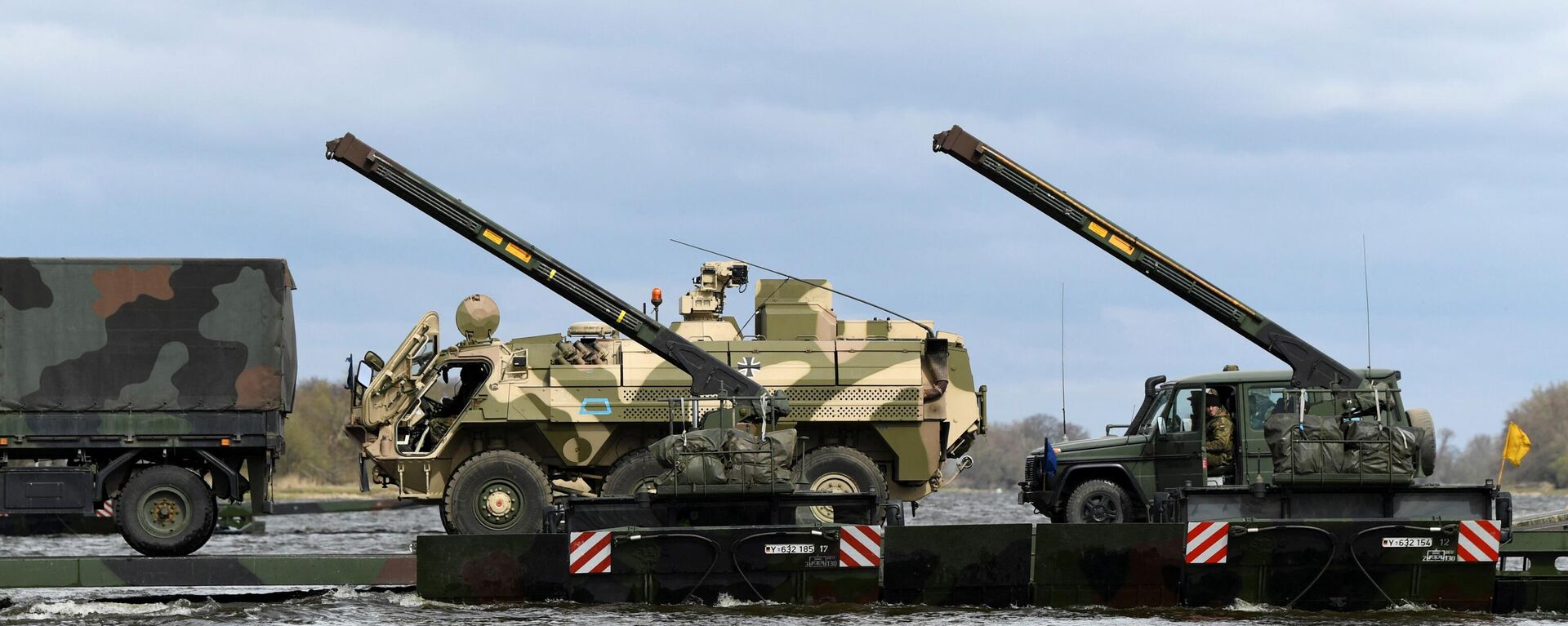https://sputnikglobe.com/20220403/poland-is-open-to-hosting-of-us-nukes-countrys-deputy-prime-minister-says-1094439979.html
Poland is 'Open' to Hosting of US Nukes, Country's Deputy Prime Minister Says
Poland is 'Open' to Hosting of US Nukes, Country's Deputy Prime Minister Says
Sputnik International
The politician also called on NATO to deploy a peacekeeping mission in Ukraine and send the weapons President Volodymyr Zelensky has been requesting to the... 03.04.2022, Sputnik International
2022-04-03T10:46+0000
2022-04-03T10:46+0000
2022-04-03T10:46+0000
poland
us
nuclear weapons
https://cdn1.img.sputnikglobe.com/img/07e6/04/03/1094439884_0:0:3000:1688_1920x0_80_0_0_e961a53e35b11ae1930d6784d8ffb858.jpg
Poland's Deputy Prime Minister Jaroslaw Kaczynski has stated that Warsaw is ready to consider hosting American nuclear weapons if such an opportunity presents itself. The moment came in an interview with Germany's Welt am Sonntag.The deputy PM noted that deploying American nukes in Poland is currently not on the agenda, but added that it might change "soon".Kaczynski also called on NATO to create a new command centre in Poland akin to the one located in Brunsume, in the Netherlands, where the alliance's joint operations are planned. He believes that it would send a signal to Moscow that NATO's command level is present in the alliance's eastern flank.The politician condemned the alliance's response to Russia's decision to conduct a special military operation in Ukraine arguing that NATO could have provided more assistance to Kiev. He proposed sending a peacekeeping operation to the country and delivering the weapons that Ukrainian President Volodymyr Zelensky has been requesting.The US and several other alliance members opposed sending advanced weapons to Ukraine, but contemplated providing old Soviet-made armaments, such as fighter jets. They also repeatedly spoke against sending NATO or national armed forces to Ukraine, citing fears of an armed conflict with Moscow that could turn into a nuclear war.Moscow, in turn, advised NATO member states against sending weapons to Ukraine noting that such shipments will be considered as valid targets by the Russian military.Russian President Vladimir Putin ordered to launch a special military operation in Ukraine on 24 February following a defensive request from the Donetsk and Lugansk People's Republics (DPR and LPR), which had been reporting intensified shelling by Ukraine's armed forces and nationalist battalions. Putin described the goals of the operation as the demilitarisation and de-nazification of Ukraine.Moscow and Kiev are currently engaged in negotiations to end the operation. During the latest in-person round of talks in Istanbul, Ukraine presented its proposal for a final agreement that included the country being non-aligned and non-nuclear, a refusal to join NATO, host certain types of armaments, foreign troops, and military bases, as well as suggested that a group of countries will ensure Ukraine's security in the future. The head of the Russian delegation, Vladimir Medinsky, has since stated that work on the text of the final agreement will continue on 4 April via video conference.Let's stay in touch no matter what! Follow our Telegram channel to get all the latest news: https://t.me/sputniknewsus
https://sputnikglobe.com/20220403/bundeswehr-chief-in-no-circumstances-will-nato-send-troops-to-ukraine-as-kiev-eyes-guerrilla-war-1094434037.html
poland
Sputnik International
feedback@sputniknews.com
+74956456601
MIA „Rossiya Segodnya“
2022
Tim Korso
https://cdn1.img.sputnikglobe.com/img/07e6/03/0d/1093831826_0:0:216:216_100x100_80_0_0_e3f43a960af0c6c99f7eb8ccbf5f812c.jpg
Tim Korso
https://cdn1.img.sputnikglobe.com/img/07e6/03/0d/1093831826_0:0:216:216_100x100_80_0_0_e3f43a960af0c6c99f7eb8ccbf5f812c.jpg
News
en_EN
Sputnik International
feedback@sputniknews.com
+74956456601
MIA „Rossiya Segodnya“
Sputnik International
feedback@sputniknews.com
+74956456601
MIA „Rossiya Segodnya“
Tim Korso
https://cdn1.img.sputnikglobe.com/img/07e6/03/0d/1093831826_0:0:216:216_100x100_80_0_0_e3f43a960af0c6c99f7eb8ccbf5f812c.jpg
poland, us, nuclear weapons
poland, us, nuclear weapons
Poland is 'Open' to Hosting of US Nukes, Country's Deputy Prime Minister Says
The politician also called on NATO to deploy a peacekeeping mission in Ukraine and send the weapons President Volodymyr Zelensky has been requesting to the country. Moscow has repeatedly warned the alliance against such actions, with some NATO member states standing up against further escalating tensions with Russia.
Poland's Deputy Prime Minister Jaroslaw Kaczynski has stated that Warsaw is ready to consider hosting American
nuclear weapons if such an opportunity presents itself. The moment came in an interview with Germany's
Welt am Sonntag.
"If the US asked us to deploy nuclear weapons in Poland, we would be open to this option. Such a step would boost deterrence against Moscow", Kaczynski said.
The deputy PM noted that deploying American nukes in Poland is currently not on the agenda, but added that it might change "soon".
Kaczynski also called on NATO to create a new command centre in Poland akin to the one located in Brunsume, in the Netherlands, where the alliance's joint operations are planned. He believes that it would send a signal to Moscow that NATO's command level is present in the alliance's eastern flank.
The politician condemned the alliance's response to Russia's decision to conduct a special military operation in Ukraine arguing that NATO could have provided more assistance to Kiev. He proposed sending a peacekeeping operation to the country and delivering the weapons that Ukrainian President Volodymyr Zelensky has been requesting.
The US and several other alliance members opposed sending advanced weapons to Ukraine, but contemplated providing old Soviet-made armaments, such as fighter jets. They also repeatedly spoke against sending NATO or national armed forces to Ukraine, citing fears of an armed conflict with Moscow that could turn into a nuclear war.
Moscow, in turn, advised NATO member states against sending weapons to Ukraine noting that such shipments will be considered as valid targets by the Russian military.
Russian President Vladimir Putin ordered to launch a special military operation in Ukraine on 24 February following a defensive request from the Donetsk and Lugansk People's Republics (DPR and LPR), which had been reporting intensified shelling by Ukraine's armed forces and nationalist battalions. Putin described the goals of the operation as the demilitarisation and de-nazification of Ukraine.
Moscow and Kiev are currently engaged in negotiations to end the operation. During the latest in-person round of talks in Istanbul, Ukraine presented its proposal for a final agreement that included the country being non-aligned and non-nuclear, a refusal to
join NATO, host certain types of armaments, foreign troops, and military bases, as well as suggested that a group of countries will ensure Ukraine's security in the future. The head of the Russian delegation, Vladimir Medinsky, has since stated that work on the text of the final agreement will continue on 4 April via video conference.
Let's stay in touch no matter what! Follow our Telegram channel to get all the latest news: https://t.me/sputniknewsus 


